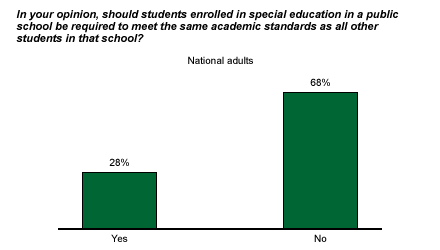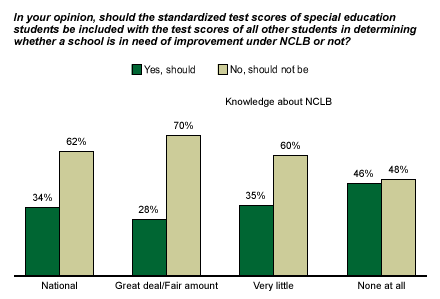Few would disagree with No Child Left Behind's intention of ensuring "that all children have a fair, equal, and significant opportunity to obtain a high-quality education." It's when one delves into the implementation that disagreements with the educational policy arise. One area of disagreement is how students with special needs are assessed and included in the NCLB accountability system.
Ninety-five percent of students with disabilities are required to take standardized achievement tests. And, although Education Secretary Margaret Spellings has worked to introduce some flexibility regarding alternate assessments for special education students, in many cases, these students must meet the same academic standards as their non-disabled peers. Further, special education students' scores are factored into the total score for each school, which determines whether a school has made adequate yearly progress (AYP) or is in need of improvement. If schools fail to make AYP two years in a row, they face sanctions. Some continue to worry what these standards mean for the quality of education that individual students with disabilities get, while others worry about what it means for the school or district as a whole.
Standard Standards
According to a recent Phi Delta Kappa/Gallup survey of the American public*, slightly more than a quarter of Americans (28%) believe students enrolled in special education in a public school should be required to meet the same academic standards as all other students, while more than two-thirds (68%) believe they should not.

In terms of whether special education students' standardized test scores should be included with other students' scores, only 34% say they should be, while 62% say they should not be. Americans who are more knowledgeable about NCLB are more likely than those who know nothing about it to think test scores shouldn't be included. Twenty-eight percent of Americans who know a great deal or a fair amount about NCLB say disabled students' test scores should be included, while 70% say they should not be. Of those who know nothing at all about NCLB, 46% say scores should be included, while 48% say they should not be.

Americans are divided, though, when asked whether a school should be designated as "in need of improvement" if its special education students are the only group whose test scores fail to meet NCLB. Forty-seven percent say the school should be designated as in need of improvement, while 48% say it should not be.
As part of Spellings' revised special education guidelines, eligible states can adjust their 2004-2005 AYP definition for disabled students to "reflect the need for alternate assessments based on modified achievement standards." So, schools in these eligible states that did not make AYP based solely on the scores of their disabled students may not be penalized.
Bottom Line
According to a poll of teachers commissioned by Education Week for Quality Counts 2004, most teachers agree in principle that students with disabilities should be held to high standards, but the majority disagree with the types of measurement and comparison NCLB mandates.
- Eighty-five percent think it is unfair for special education students and teachers to be evaluated on how well special education students achieve based on test scores.
- Eighty-four percent think special education students should not be expected to meet the same set of standards as their general education peers.
- Seventy-eight percent say requiring special education students to meet state standards and take state tests will actually hurt their individualized education.
For the most part, advocates and opponents of NCLB rarely see eye-to-eye on special education. Supporters laud the idea that special education students finally "count," while opponents feel the law is not flexible enough to meet disabled students' individual needs. It will be important for sustainable education reforms to account for both perspectives -- and to recognize that both sides have the best interests of special education students in mind.
*This article contains findings from the 37th Annual Phi Delta Kappa/Gallup Poll of the Public's Attitudes Toward the Public Schools, released on Aug. 23 in Washington, D.C.
The findings of the survey are based on telephone interviews with a random sample of 1,000 U.S. adults, aged 18 and older, conducted from June 9 to June 26, 2005. For results based on this sample, one can say with 95% confidence that the maximum error attributable to sampling and other random effects is ±3 percentage points.